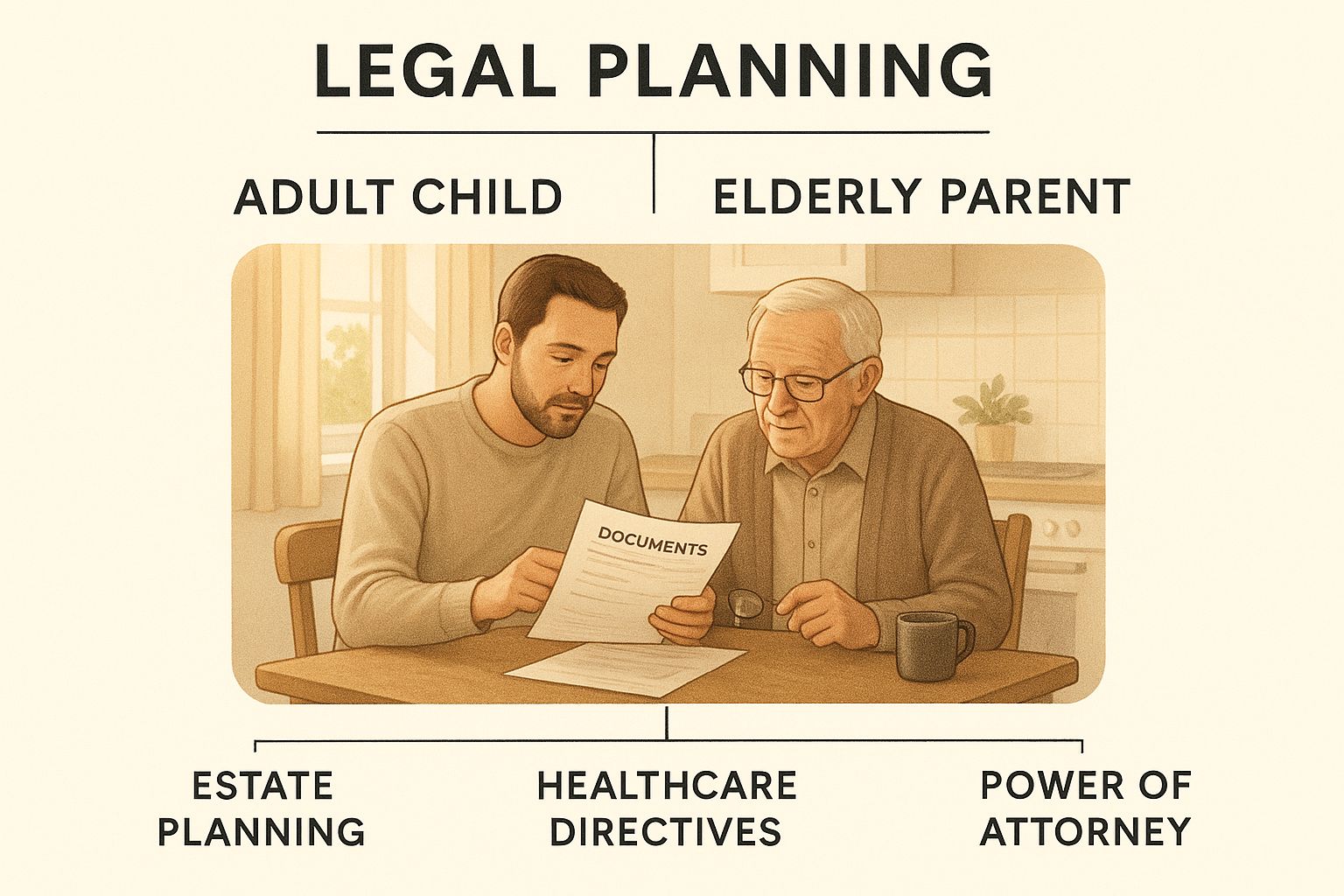A Power of Attorney (POA) is a legal document that lets you handpick a trusted person—known as your "Agent"—to step in and manage your financial or healthcare decisions if you're ever unable to do it yourself. In plain English, you're designating a co-pilot for your life's most important matters. This ensures your affairs are handled exactly the way you'd want, even when you can't be the one at the controls.
What a Power of Attorney Really Means for Your Family
For Texas families, creating a POA isn't about giving up control. It’s a powerful, proactive step to protect your legacy and lift a heavy burden from your loved ones' shoulders during what could be an incredibly stressful time. This document is a cornerstone of responsible understanding the basics of estate planning in Texas, putting you in the driver's seat of who acts for you, instead of leaving that critical decision to a judge.
Without a POA, your family might be forced into a complex and often expensive Guardianship proceeding in court. This legal tool has deep roots, and if you want a broader overview, this guide on What Is Power of Attorney Explained Simply is a great resource. Most states, including Texas, have adopted versions of the Uniform Power of Attorney Act, with specific rules found in Title 2 of the Texas Estates Code, to create a consistent framework for these essential documents.
These aren't just legal papers; they represent crucial family conversations.

As you can see, these discussions are an act of care. They're about making sure everyone’s wishes are understood, respected, and legally protected, which is key to maintaining family harmony for years to come.
Exploring the Different Types of POAs in Texas
A Power of Attorney isn't a one-size-fits-all document. The law in Texas provides a few distinct types, each designed for a specific job. Understanding these differences is the key to choosing the right tool for your family's needs.
Think of it like picking the right wrench from a toolbox. You wouldn't use a massive pipe wrench for a delicate job. In the same way, the POA you create depends entirely on what you need your Agent to do—and when you need them to do it.
The Major Categories of POAs
Most POAs fall into a few key categories, usually dealing with either your finances or your healthcare. Each one is governed by rules found in the Texas Estates Code, which ensures they are legally sound and enforceable when it matters most.
Let's break down the most common options you'll encounter in plain English.
General Power of Attorney: This is a comprehensive type, giving your Agent sweeping authority to handle almost all of your financial and legal affairs. This could include paying your mortgage, managing bank accounts, or buying/selling property on your behalf. Its major limitation? A General POA typically ends the moment you become incapacitated.
Special (or Limited) Power of Attorney: This document is all about focus. It grants your Agent authority to perform a single, specific task or to act for a limited time. For instance, you could use a Special POA to let your brother sell your truck while you’re out of the country. Once that task is done, the POA’s power evaporates.
Medical Power of Attorney: This is strictly for healthcare. It empowers your Agent to talk with doctors, review your medical records, and make critical decisions about your treatment if you're unable to speak for yourself. This document is a non-negotiable part of any solid advance directive.
The use of Powers of Attorney is not limited to financial affairs; they are also crucial in personal care and healthcare decisions. An enduring Power of Attorney, for example, continues to be effective even if the principal becomes mentally incapable of managing their own affairs. Learn more about the importance of POAs for personal care.
To help clarify the differences, let's look at how these common POAs stack up against each other.
Comparing Types of Power of Attorney in Texas
| Type of POA | Primary Purpose | When It Becomes Effective | When It Ends |
|---|---|---|---|
| Durable Power of Attorney | Manages financial affairs | Immediately (unless specified otherwise) | Upon your death |
| General Power of Attorney | Manages financial affairs | Immediately | Upon your incapacity or death |
| Special/Limited Power of Attorney | Completes a specific, defined task | Immediately | When the task is done or a date passes |
| Medical Power of Attorney | Makes healthcare decisions | When a doctor certifies you are incapacitated | When you regain capacity or upon your death |
This table shows why the timing and purpose of each document are so important. Choosing the right one ensures your wishes are followed exactly as you intend.
The Critical "Durable" Provision
Here’s where things get really important. Perhaps the most powerful feature you can add to a financial POA is what’s called a durable provision. A standard General POA becomes worthless the moment you are declared mentally incapacitated.
But a Durable Power of Attorney is different. It’s built to last. It remains in effect—or can even be written to become effective—upon your incapacity.
This durability is what makes a POA such an essential planning tool. It allows your Agent to step in and manage your finances without missing a beat, preventing your family from the agonizing process of seeking a court-ordered Guardianship during an already stressful time.
How to Choose the Right Agent for Your POA

Choosing the person who will act as your Agent is, without a doubt, the most important decision you'll make when creating a Power of Attorney. This isn't just a legal formality; it's a profound act of trust. You're handing someone the authority to make critical decisions about your finances, property, and even your healthcare.
The person you pick has to be someone you trust implicitly. They must be capable of putting your best interests first, no matter what. This role demands more than just good intentions—it requires reliability, sharp judgment, and unwavering integrity.
Essential Qualities of a Dependable Agent
When you're thinking about who to choose, consider who truly embodies these core traits. The ideal Agent is not only trustworthy but also organized enough to handle complex responsibilities, often during what could be a very stressful time.
Look for someone with:
- Unwavering Trustworthiness: This is the absolute foundation. Your Agent will see your sensitive information and control your assets, so you must be completely confident they will act honorably.
- Strong Financial Judgment: Do they manage their own finances well? A good track record here is a strong indicator they'll handle your affairs with the same care and diligence.
- Assertiveness and Advocacy: Your Agent needs to be your champion, especially in medical situations. They should be firm yet compassionate when dealing with banks or healthcare providers on your behalf.
- Willingness to Serve: The role of an Agent can be demanding. Make sure the person you choose understands what's involved and is genuinely willing to take on the responsibility.
Realistic Scenario: Imagine Maria, a widow, has three adult children. While she loves them all equally, she chooses her son, David, a CPA, to be her Agent. David has proven financial sense and a level-headed approach to tough situations. To prevent future misunderstandings or hurt feelings, Maria sits down with all three children to explain her decision, emphasizing that it is based on skills, not favoritism. This open conversation ensures family harmony and clarity.
The Importance of a Successor Agent
Life is unpredictable, which is exactly why naming a backup, or Successor Agent, is so crucial. If your first choice can't or won't serve when the time comes, your Successor Agent can step in without a hitch.
Without a named backup, your family might have to go to court to establish a Guardianship—the very thing a Power of Attorney is designed to avoid. This one simple step adds an essential layer of protection and keeps your plan on track.
Understanding the Powers You Can Grant to an Agent
When you create a Power of Attorney, you’re in the driver's seat. You decide exactly how much authority your Agent gets. This isn't an all-or-nothing deal; the document can be tailored to fit your life, granting powers that are incredibly broad or strictly limited to a single, specific task.
The Texas Estates Code lays out a whole menu of powers you can assign. Think of it this way: you can authorize your Agent to handle almost any financial matter you would handle yourself. The key is to be intentional, granting only the authority you're comfortable with and that your situation truly demands.
Common Powers Assigned to an Agent
You can give your Agent the power to manage a wide range of responsibilities on your behalf. These often include:
- Real Estate Transactions: Buying, selling, or managing your property.
- Financial and Banking Decisions: Opening or closing bank accounts, handling investments, and paying bills.
- Government Benefits: Applying for and managing benefits like Social Security or Medicare.
- Tax Matters: Filing tax returns and communicating with the IRS.
- Business Operations: Continuing to run or wind down a small business you own.
This kind of proactive planning is becoming more and more common. In fact, the global estate planning service market is projected to grow at a CAGR of 9.0% from 2024 to 2034, which shows a rising awareness of just how vital these tools are. You can find more insights about this trend in estate planning on market.us.
Under the Texas Estates Code, specifically Title 2, Chapter 752, you have the ability to explicitly state which powers you grant. If a power is not initialed or specified in the document, your Agent cannot legally perform that action.
It’s absolutely critical to remember that an Agent’s power under a financial POA ends the moment you pass away. At that point, the executor named in your will steps in to take over. This can lead to potential Probate Litigation if roles and responsibilities are not clear. To get a clearer picture, you can read our guide on the differences between a POA and an executor.
Creating a Legally Sound Power of Attorney in Texas

For a Power of Attorney to actually work when you need it, it has to meet specific legal standards. Grabbing a generic template off the internet is a huge gamble—those one-size-fits-all forms often miss the mark on Texas law, leaving your family exposed right when they need protection the most.
Think of a valid POA as a shield against messy legal challenges and painful family disputes. It ensures the person you trust can step in and act for you without getting tangled up in court delays. Taking the right steps now is really about buying peace of mind for whatever comes next.
Key Legal Requirements in Texas
The Texas Estates Code, specifically Title 2, Chapter 751, lays out the ground rules. These aren't just suggestions; they are the essential building blocks of a document that will hold up under scrutiny.
To be valid, your POA must:
- Be in Writing: An oral agreement won’t cut it. The document has to be on paper.
- Be Signed by the Principal: You, the person granting the power, have to sign it. If you’re physically unable, someone else can sign for you, but it must be done in your presence.
- Be Acknowledged Before a Notary Public: Your signature needs to be notarized. This is the official step that verifies your identity and proves you signed it willingly.
Key Insight: One of the most critical requirements is that you must have contractual capacity at the moment you sign. This just means you have to be of sound mind and fully grasp what the document does and what powers you're giving your Agent.
Why Professional Guidance Matters
It’s tempting to use a free online form, but that shortcut can lead to devastating problems. A poorly drafted POA might be completely invalid, or worse, it could grant powers you never intended to give away.
An experienced attorney does more than just fill in blanks. They make sure your POA is fully compliant with the Texas Probate Process and, just as importantly, is tailored to your unique wishes and family situation. Working with a legal professional helps you build a rock-solid document that protects you and fits seamlessly with your other estate planning documents, like your Wills & Trusts.
Key Takeaway: Your Essential Insights on Power of Attorney
Getting a handle on what a power of attorney is represents a huge step toward protecting your independence and your family's future. It’s one of the most critical documents in any estate plan, giving you peace of mind that you're prepared for whatever life throws your way.
If you remember nothing else from this guide, let it be these three points:
- You Stay in the Driver's Seat: A POA puts you in charge of who manages your affairs if you can't. Without one, you’re leaving that incredibly personal decision up to a judge who doesn't know you.
- Durability is Non-Negotiable: A Durable Power of Attorney is the only kind that truly plans for incapacity. It’s designed to keep working exactly when you need it most.
- Professional Guidance is Key: Working with an attorney is the best way to ensure your POA is legally sound, valid under Texas law, and actually does what you want it to do.
Taking this step isn't just about legal documents; it's an act of care for the people you love. It ensures they are empowered to help you without the stress and expense of a court battle.
Answering Your Questions About Texas POAs
Even when you have a plan, it's normal to have questions. This whole process can feel overwhelming, but getting clear, straightforward answers can make all the difference. Here are some of the most common concerns we hear from Texas families, answered in plain English.
When Does a Power of Attorney Kick In?
A POA can be designed to work in one of two ways. It can take effect the moment you sign it, giving your agent immediate authority.
Alternatively, it can be a "springing" POA, which only activates after a specific event happens—most commonly, when a doctor certifies in writing that you are incapacitated. A Durable Power of Attorney is crucial because it remains valid even after you become incapacitated, which is the entire point for most people creating one.
Can I Change My Mind or Revoke My POA?
Absolutely. As long as you are mentally competent, you have the right to change or completely revoke your Power of Attorney at any time.
This isn't a verbal agreement, though. You must do it in writing. It's also critical to notify your former agent and any financial institutions that have a copy of the old document to avoid any confusion.
What Happens if I Don’t Have a POA?
This is where things can get difficult, expensive, and public. If you become incapacitated without a Power of Attorney, your family will likely have to go to court to establish a Guardianship.
In that scenario, a judge—not you—gets to decide who will manage your personal and financial affairs. This process can be slow, stressful, and costly, taking control away from the people you trust most.
Does a POA Help Avoid Probate?
No, and this is a very common misconception. A financial POA is a powerful tool for managing your affairs while you are alive, but its authority ends the moment you pass away.
It's vital to understand that Power of Attorney authority expires at death. To manage what happens to your property after you're gone, you'll need a will or a trust. You can learn more about the different roles these documents play in our guide to POAs vs. Wills in Texas.
If you’re facing probate in Texas, our team can help guide you through every step — from filing to final distribution. Schedule your free consultation today.







